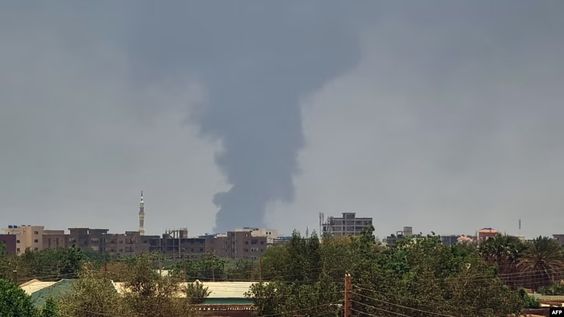Africa
Fighting Breaks Out in Sudan’s Capital; Talks Make No Headway

As witnesses reported airstrikes, rocket-propelled grenades, and shooting in many districts, fighting in the capital of Sudan grew worse on Wednesday. Fighting between tribes that lasted for many days in southern Sudan has increased concerns that the crisis, which is mostly focused on Khartoum, could spread.
For the second day, the Sudanese army under the command of General Abdel Fattah al-Burhan attacked targets in Khartoum and its two sister cities, Omdurman and Bahri, in an effort to drive out the paramilitary Rapid Support Forces under the command of General Mohamed Hamdan Dagalo, who have dug in and taken control of residential areas since fighting started in mid-April.
“Heavy airstrikes and RPG fire have been going on since 6:30 in the morning,” Ahmed, a resident of Shambat’s Bahri district, told Reuters. People who live close by fled to the Nile to seek safety there beneath the embankment while we were on the ground.
It is unclear if the fighting in Khartoum led to the violence between the Hausa and Nuba tribes in southern Sudan. In the southern and western parts of Sudan, such violence is not unusual. According to the nation’s doctors union, 25 people have died in the most recent conflict there.
More than 600 people have died and more than 5,000 have been injured in Sudan’s deadly fighting, according to the World Health Organization on Tuesday.
“Our only hope is that the negotiations in Jeddah succeed to end this hell and return to normal life, and to stop the war, the looting, the robbery, and the chaos,” Ahmed Ali, 25, of Khartoum told Reuters.
In Saudi Arabia, representatives from the army and the RSF have been meeting for about a week. According to a Western diplomat with knowledge of the negotiations, the mediators were concentrating on reaching a deal on a cease-fire and humanitarian access.
Undersecretary of State for the United States Victoria Nuland stated that American negotiators were “cautiously optimistic” on both issues.
Following the 2019 overthrow of longtime leader Omar al-Bashir, the two generals, who were once allies, planned an October 2021 military coup that stalled a transition to civilian administration.
Conflicts between the generals over who should oversee the RSF’s integration into the army and how it should be done have been escalating. The military was reorganized as part of an effort to put an end to the political turmoil brought on by the military coup in 2021 and return the nation to civilian control.
Numerous cease-fire agreements haven’t been able to put an end to the fighting or even significantly lessen the violence.
More than twice as many Sudanese have abandoned their homes since the violence began last month, according to the United Nations agency for refugees, which listed 334,000 as internally displaced last week.
An additional 100,000 Sudanese, according to the International Organization for Migration, have left the nation.